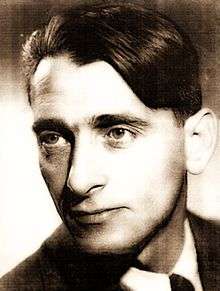Harry Brauner
Harry Brauner (24 February 1908, Piatra Neamţ – 11 March 1988, Bucharest) was an ethnomusicologist, composer, and professor of music from Romania.

Born into a Jewish family with many children, Brauner moved in 1913 to Vienna with his family, where they stayed for two years.[1] When they returned to Romania, they lived first in Brăila, and later in Bucharest. There he studied at the Music Academy, having as teachers, among others, Constantin Brăiloiu, Dumitru Georgescu Kiriac and Stefan Popescu. In 1927, he was named secretary of the Composers' Society's so-called Folklore Archives.[1]
Brauner was one of those who discovered Romanian folk music diva Maria Tănase in the mid-1930s.[1] He eventually became her official biographer.
During the war, he was a teacher at a Jewish high school in Bucharest, in 1944 he became music adviser at the Romanian Radio Broadcasting Company in charge of folklore, and in 1949 he became head of the Folklore Department at the Music Academy in Bucharest.[1]
Brauner was implicated in the show trial against Lucrețiu Pătrășcanu, and spent 12 years in prison, most of it in solitary confinement. He was released from prison in 1962, sent into internal exile to a village near Slobozia. He married Lena Constante in 1964. In 1966, he was allowed to travel to the Venice Biennale, Italy, where his brother Victor Brauner exhibited some of his works at the French pavilion.[1]
In 1967, after being named a member of the Paris Music Biennale, he was allowed to travel to Paris, where he became acquainted with Marc Chagall. In 1968, both he and Lena Constante were rehabilitated and given a meager pension for their sufferings.[1]
A close collaborator of Constantin Brăiloiu, Brauner recorded about 5000 Romanian folk songs.[2]
Books
- Să auzi iarba cum crește ("To Hear How the Grass Grows"), Editura Eminescu, Bucharest, 1979
References
- Ornea, Zigu (1999). "Din viata lui Harry Brauner" (in Romanian). Romania literara. Retrieved 17 November 2014.
- Datcu, Iordan (2008). "Harry Brauner" (in Romanian). Romania literara. Retrieved 17 November 2014.
Further reading
- Constante, Lena. 1995. The Silent Escape: Three Thousand Days in Romanian Prisons. Berkeley: University of California Press.
- Marian-Bălaşa, Marin. 2000. Harry Brauner: Field Collector, Director, Victim, and Love. European Meetings in Ethnomusicology 7:83–192.
- Irina Nicolau, Carmen Hulută, Surîsul lui Harry ("Harry's Smile"), Ars Docendi, Bucuresti, 1999.